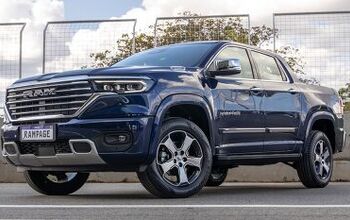After the NOx Particulates Settle, Everyone Loses

Volkswagen broke the law.
Scratch that. Volkswagen knowingly went out of their way to break the law, did as much as they could to cover up that fact, and only admitted to wrongdoing when the evidence was so heavy that the German giant couldn’t stand under the weight of its own conspiracy.
Nearly 11 million vehicles worldwide — of which 482,000 made their way to the United States — were fitted with a “defeat device” which used a different engine map when being tested for emissions. That device allowed the Volkswagen TDIs to pass sniffer tests on a dyno, but on-road evaluations by the International Council on Clean Transportation showed the four-cylinder diesels were emitting up to 40 times the allowable nitrogen oxides in the real world.
A few things are going to happen. None of it will be pretty. Nobody is going to walk away from this without oily blowback on their faces.
The EPA will be proven toothless. $18 billion. That’s the maximum fine the EPA can levy with regards to Volkswagen’s brazen attempts to subvert United States’ emission regulations. It’s based on a $37,500 fine per car sold that doesn’t comply with the EPA’s regulations.
$7.3 billion. That’s the amount Volkswagen has set aside, via a charge they’ll take in the third quarter, to cover a mess that resembles the oily film that pools around a diesel pump.
Why is there such a discrepancy between the two numbers? Because Volkswagen knows they’ll never have to pay the full fine.
The largest Clean Air Act-related civil penalty to date was, in fact, levied against another automaker. Hyundai and Kia agreed to pay $100 million for 1.2 million vehicles sold that emitted 4.75 million metric tons of greenhouse gases above and beyond what those companies had self-certified to the EPA. Hyundai and Kia also had to give up $200 million in greenhouse gas emissions credits and agree to spend $50 million on projects to make sure it didn’t happen again.
Make no bones about it: the EPA will make an example of Volkswagen. It just won’t be an $18 billion example. Expect it to be the largest Clean Air Act-related civil penalty ever levied against an automaker by many hundreds of millions dollars — right around $1.5 billion. Also, no matter what happens, self-certification will continue because the EPA is underfunded. (Though, an $18 billion influx of cash could fix that.)
The U.S. government will also be proven toothless. Unless Volkswagen offers up one of its own on a silver platter, nobody will go to jail.
A criminal investigation will be conducted. Many people will be interviewed. Volkswagen will commit to an internal investigation. Engineers and other decision makers will be quietly shown the door.
And that will be that.
Just like with General Motors and Toyota, Volkswagen will agree to a deal where they admit criminal wrongdoing and pay a paltry sum to defer prosecution.
The largest fine ever levied against an automaker is still the $1.2 billion Toyota agreed to pay regarding sudden acceleration cases. GM was last week saddled with a $900 million fine for killing people covering up the circumstances surrounding the ignition switch recall.
This will be the third time — and certainly not the last — in recent history where an automaker looks down the barrel of criminal charges and sees the empty chamber can be stuffed with cash.
Volkswagen will buy back, not fix, non-SCR cars. Based on cost alone, it’s in Volkswagen’s best interest to buy back the offending metal and sell them in regions with “friendlier” emissions laws. Whether they actually get shipped elsewhere for resale is another story altogether.
For those who choose to keep their cars, Volkswagen will be forced to pay some sort of polluter fee, as many TDI owners will likely exclaim “I’ll give you my Volkswagen when you pry it from my cold, dead hands.”
If a fix is employed — which at this point could be a very aggressive software and engine map update — customers will be given some severance due to increased fuel consumption (if goes up from the EPA rating) or decreased performance. Diehards will chip their TDIs to bring performance back up.
No matter how good the new Passat/Tiguan turn out to be, Volkswagen will continue to flag in the United States. Those in the know will continue to see Volkswagens as a solid deal with incentives on the hood. Those susceptible to the 24-hour news cycle will avoid walking into Volkswagen dealerships — just like they’ve done until now.
Unfortunately for Volkswagen, the buyers who are most likely to be swayed by a brand new crossover are also the same people swayed by the 24-hour news cycle. The second-generation Tiguan will do better than the old model, but the gains will be marginal.
As sales continue to slide, so will Volkswagen’s stock price, especially if the automaker props up dealers in the long run.
Media members will distance themselves from Volkswagen’s previous diesel marketing initiatives (which points to a much larger issue). The number of automotive journalists that have taken to social media in the last couple of days to express how they feel cheated by Volkswagen is in the dozens. Almost every automotive media professional has been on one Volkswagen or Audi TDI “clean” drive. Those journalists will claim that we (myself included) have given our trust to the automaker and now that trust is gone. Awards will be taken back.
However, this is just a symptom of a much larger problem: The modern automobile is incredibly complex.
In order to truly evaluate a car to the degree needed to find emissions issues, journalists must have access to testing equipment — and it isn’t cheap. Manufacturers of portable emissions measurement equipment (PEMS) sell their wares for approximately $100,000. Very few automotive outlets, let alone freelance automotive journalists, can afford this investment; maybe only Consumer Reports, IIHS and a couple other outlets supported by larger media conglomerates. The return on investment will be virtually nil unless another Volkswagen happens.
The truth is Alex Dykes, who does instrumented testing and provides more information than 99-percent of other automotive reviewers in the industry, and the few like him can only do so much. Professional automotive reviewers can give a lot of qualitative information, but quantitative data is — and will remain — financially out of reach for virtually all of us.
Diesel will be set back 10 to 20 years for those of us who value it most. Outside of pickups, the only non-premium automakers that sell diesels in America are Volkswagen, Chevrolet and Jeep. That’s it. If you want a diesel car without one of those badges affixed to the grille, you have to spend extra to graduate to BMW, Mercedes or Audi. (Also, the Jeep Grand Cherokee with the optional 3.0-liter V-6 turbodiesel is incredibly expensive.)
Volkswagen diesels were affordable for the people. If you wanted compression ignition, you paid a small premium between $800 to $2,000 for the privilege of getting stellar fuel economy without driving a Prius. You were also rewarded with big lumps of torque and the option of a manual transmission.
Those days will be gone for the foreseeable future.
It’s too bad, too. Those of us on the lower end of the consumer ladder are the ones who appreciate efficiency more so than those buying luxury diesel SUVs. We are the misers who have to be miserly. For those purchasing a vehicle from one of the premium German brands, being miserly in simply a choice.
However, all diesels — passenger cars, SUVs, and pickups — will now all be under the microscope, especially other diesels from Volkswagen’s group of brands. Over the next few months, we will receive a trickle of press releases from automakers that manufacture diesels proclaiming their innocence while pointing to on-road testing evaluations published by third parties.
That scrutiny will happen in almost every jurisdiction. The United States, Canada and South Korea have all launched investigations into Volkswagen’s four-cylinder diesels. The number of other regulatory bodies to get on this bandwagon will grow exponentially.
Euro-centric diesel haters will fight harder. Those looking to ban diesels in European metropolitan areas will ride this controversy to their benefit. Regional governments, such as Paris, will be under even more pressure to ban diesels — or maybe fossil fuel-only vehicles full stop — from their inner cities.
Diesels in Europe are a fair bit dirtier than they are in the U.S. because the European Union allows them to be. However, chances are those Euro 6 regulations will be tightened even further — and probably fairly quickly by government regulatory standards.
Everyone will lose … except the lawyers. We are less than a week into this fiasco and class-action attorneys all over the United States are licking their lips before the feast.
Class-action lawsuits are inevitable in the United States in cases like these. Unfortunately, all the parties involved in a class action of this scale — save the lawyers — end up losing. Volkswagen and the attorneys will come up with an “agreeable” civil penalty, current VW diesel owners will be given what amounts to pennies on the dollar for whatever losses — real or otherwise — they’ll experience because of the emissions mess, and the lawyers will walk away with millions of dollars in fees.
You don’t have to be part of a class action if you don’t want. You could take Volkswagen to court independently. However, your risk of losing is exponentially higher and you also assume all the financial risk of launching your own case.
(This last point was written before Winterkorn announced his resignation.)
Winterkorn will be sacked. It might not happen this week, even though the affable CEO’s contract is expiring this Friday, but it will happen.
While Ferdinand Piech — whom Winterkorn famously had a blowout with earlier this year — is no longer in the chairman’s seat on the Volkswagen AG board, he’s still on the board of Volkswagen’s parent company, Porsche SE, and holds considerable power.
We’d be ignorant to think this situation was devised by Piech in order to oust Winterkorn. That’s a theory reserved for conspiracy theorists and other personalities destined for A&E. However, we’d also be ignorant to think Piech won’t use this situation to his benefit.
Winterkorn will be shown the door, likely with Piech holding the handle, and another Volkswagen lifer will take his place.

More by Mark Stevenson
Latest Car Reviews
Read moreLatest Product Reviews
Read moreRecent Comments
- SCE to AUX Figure 160 miles EPA if it came here, minus the usual deductions.It would be a dud in the US market.
- Analoggrotto EV9 sales are rivalling the Grand Highlander's and this is a super high eATP vehicle with awesome MSRPs. Toyota will need to do more than compete with a brand who has major equity and support from the automotive journalism community. The 3 row game belongs to HMC with the Telluride commanding major marketshare leaps this year even in it's 5th hallowed year of ultra competitive sales.
- Analoggrotto Probably drives better than Cprescott
- Doug brockman I havent tried the Honda but my 2023 RAV4 is great. I had a model 20 years ago which. Was way too little
- Master Baiter The picture is of a hydrogen fuel cell vehicle.


































Comments
Join the conversation
@28 a bit out of my price range but if VW was very very generous with a buyback... @seth Lexus LS430 or LS460. You’re welcome.
Mark, NOx is not emitted as "particulates": it is a gas, --- unless you were using the word metaphorically! ==================